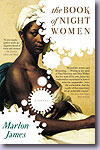

The Book
of Night Women
The Book of Night Women by Marlon James is a harrowing, unforgettable journey into the history
of slavery in Jamaica in the eighteenth century, told from the point of view of Lilith, half-black and
half-white. Both poet and reporter, the author has conceived of the entire story in patois as he traces
the stages of a slave uprising, a feat that pays off: Readers fall easily into the slipstream of the
color and cadence, and the result is a seamless marvel of artistry. This is work of the most supreme
literary quality, daring to transform language into such an original realm that readers come away haunted,
short of breath, and staggered with the sort of visceral impact that reminds us why we read: Not merely
to understand other lives or worlds, but to feel them.
Though challenging, often obscene, and devastatingly graphic in places, and though James truly earns the
overused phrase �unflinching gaze,� the book�s handling of violence shies away from being leering or
gratuitous, even as we sense that the author is duty-bound to report the truth of oppression as it
historically occurred. This is fiction�s power: To conjure, through character and story, not just the
details of human horrors but also how their truth plays out upon the skin, against the backdrop of the
world, and upon the hidden emotions of us all. There�s no hiding in any era, even one removed from the
time being scrutinized.
One of the most remarkable qualities here is the careful layering of all classes and types. It will
occur to readers that they have perhaps never read a book about slavery in which the slaves themselves
are portrayed as prone to jealousy, nastiness, vulgarity, and ruthlessness: as human beings normally can
be, especially when trapped in a system that twists the human spirit. Lilith, our heroine, is not always
likable, and the slaves elevated to the foreman-like role of being �Johnny-jumpers� add complications
to any desire to classify the portraits easily. We witness the self-interest of the maroons and Robert
Quinn�s frustrations as an Irishman considered lower-class; we flinch, though not completely devoid of
sympathy, at selfish Miss Isobel�s mad attempts to leap over the gulf toward what she views as �the other
side.ďż˝
Lilith and Robert�s love story creates the book�s tumultuous heart; his audacious decision to desire
Lilith, fueled in part by his own status as an outsider, is tense from start to finish and, in addition
to blending the poetry in the service of vivid story-telling power and sturdy pacing, we arrive at the
cry for peace that makes the book worthy of this award: We�re given examples of how ordinary people, in
extraordinarily vicious circumstances, can reach out, can stop the torrential demands of old hatred and
old history. Though it�s chilling�and believable�that Quinn, outside the house, disavows Lilith to the
point of allowing her to be whipped to near death, the gift of his love in private surely plays a role
in her decision, when riots engulf Jamaica, to see her white father not as cruel and arrogant but as a
man frightened of death, and she stays to defend him. Quinn will lose his life, due to the forces unleashed,
but he has, despite his sins, put forth a measure of redemptive, healing care into an ill world.
Though the novel is harsh, it is worth recalling that it is based upon the implacably awful truths of
the history of the treatment of slaves. There is no way to make this material less than the ghastly
nightmare that it is. If we need to be reminded of who we have been, we also can take some solace in
discovering that the human spirit can fight back even in the most poisonous of circumstances. This is
a definition of courage, and the book paints a stunning and detailed map of how we divide ourselves from
one another (not merely in slavery, but in any group, any social network) and how we might work our ways
through, and across, and beyond.
ďż˝ Katherine Vaz, 2010 finalist judge
|